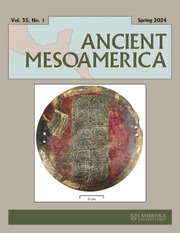Article contents
PERSONAL ART IN TEOTIHUACAN: THE THIN ORANGE GRAFFITI
Published online by Cambridge University Press: 29 December 2015
Abstract
In the Classic period Teotihuacan imported large quantities of Thin Orange ware from the Tepexi de Rodríguez area of Puebla. Thin Orange bowls were widely distributed in the city, many of them with post-firing graffiti inscribed on their walls or bases. Although not highly visible, the graffiti seem to have served as owner's marks. Some of the images, particularly in the city's central zone with its high concentration of elite residences and public structures, were drawn from the formal iconography of Teotihuacan. Most, however, seem to have been idiosyncratic expressions of personal identity or simply marks with no wider meaning. This general disinterest in the formal iconography as a source of personal imagery suggests that the ideology of the state may not have penetrated deeply into the daily lives of most Teotihuacanos and may even have stimulated some resistance.
- Type
- Research Article
- Information
- Copyright
- Copyright © Cambridge University Press 2015
References
REFERENCES
- 2
- Cited by


